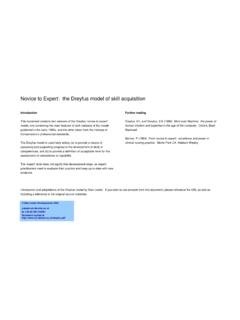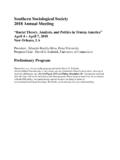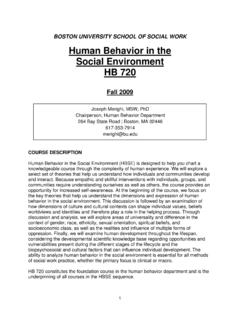Transcription of On professions and being (a) professional - devmts
1 1 On professions and being professional Stan Lester Stan Lester Developments, Taunton, UK This version September 2015. 1 Introduction This short paper grew out of a 2002 article by the author in the Journal of the Society of Archivists, vol. 23 no. 1. An earlier version was also published by the former Institute for Learning in 2009. The paper explores the idea of profession and associated matters such as professional knowledge, entry routes and what it means to be a professional . It is a personal take on the subject rather than an academic paper, though I have provided references as well as a few extracts from other of my reports or journal papers (these are italicised or in quotes, and referenced in the endnotes).
2 The paper will be updated or added to from time to time (see above for the last revision date). 2 The idea of profession The word profession stems from the Latin verb profiteri, to profess, in the sense of making a formal commitment or vow (as in taking a monastic oath). This can be interpreted as suggesting that joining a profession requires a commitment to acquiring its knowledge and skills, and to adopting its ethos. If there is any agreement on what is needed for an occupation to be a profession (using the term in its more restrictive Anglophone sense) it remains close to this etymological root.
3 Drawing on Hoyle and John1 and Freidson2, characteristics that gain fairly wide acceptance are the need for expert knowledge, normally drawing on some form of theoretical base; the presence of an ethos that serves the public good; and independence of thought and judgement that transcends any employment or contractual relationship3. A historic perspective on professions4 will tend to group them into four or more types depending on the era when they began to professionalise.
4 Generally these are the ancient professions (the priesthood, university teaching, law and physicianship); the mediaeval trade occupations (including surgery, dentistry and architecture); the industrial-era professions (typified by engineering); and various groups that emerged or professionalised in the twentieth century (from teachers and social workers to accountants and personnel managers). A recent trend is for some old-established learned professions (such as curators and some scientific occupations) to re-professionalise according to more contemporary models.
5 A social construct perspective on professions considers what kinds of occupations are generally construed to be professions . Nathan Glazer s distinction between major and minor professions partly takes this approach5, and it is also explicit in Peter Morrell s primary and secondary professions6. It can produce slightly different lists to other approaches to the study of professions (Glazer s major professions include business management, and Morrell includes senior military officers, police chiefs, professors and judges in his list of primary professions ), and the results depend 2 to an extent on how the idea of profession is presented.
6 In my experience most people will include medicine and law in their list of obvious professions , then it depends on personal knowledge and experience: architects, engineers, vets, dentists, teachers, accountants are among those commonly mentioned. A list like Morrell s is more likely to result from asking for occupations that are regarded as having authority in their fields. A static or trait perspective identifies characteristics that mark out occupations as professions . Classic examples are provided by Millerson7 and Schein8, while a more contemporary one is given by Belfall9.
7 Belfall s list includes the presence of an assessment process for entry to the profession, a common body of knowledge, a code of ethics and a professional association. The difficulty with this approach is that it can be debated endlessly, it tends to be based on a few ideal types and therefore represents a particular view of profession, and it also tends to be a product of its time. Nevertheless a few characteristics do appear to be fairly general and stand the test of time, as suggested in the opening paragraph.
8 These characteristics have the advantage of being independent of any particular model of organisation, and they can be applied to individual practitioners as much as organised professions . Of the main sociological perspectives on professions , structuralist or functionalist approaches study the functions that professions perform in relation to society, so that for instance they can be seen as means of making expertise available to the public good, and professional ethics as offering safeguards against external pressures such as those of bureaucracy and the market;10 a summary of the functionalist argument is provided by Hoyle11.
9 Neo-Weberian approaches, such as the work of Larson12, focus on professionalisation as a market 'project' and its effect in creating market or employment rewards for those who achieve professional status. Marxist approaches focus more on professions in relation to power and class relationships within society13, while interactionist approaches are concerned with the interactions that occur within practice situations and the meanings that these have in terms of wider occupational or societal relationships14.
10 Systemic approaches examine professions from an evolutionary perspective and in terms of how they interact with each other and with other societal institutions15. More recently, sociologists have tended to focus on themes such as gender, class and social mobility16, examine the colonisation of the professional ideal for managerial or political ends17, or analyse how professions work internationally18 19. 3 professions , professional associations and professionals These three concepts are often confused and characteristics overlapped, so it is worth looking at them separately.










